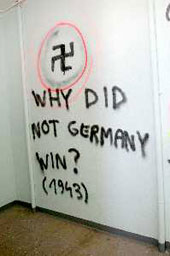Estonian Neo-Nazis regret Hitler's defeat in WWII
The tombstones of the Russian soldiers killed in WWII were desecrated across the country
Controversies over the matters relating to the situation of Russian-speaking minorities in the Baltic States give rise to a great deal of comments. Those comments are normally charged with emotion. There have been more infringements on the rights of minorities in Estonia and Latvia as opposed to neighboring Lithuania. The authorities and some of the public of Estonia and Latvia often say that the problem is far-fetched and the Russians are deliberately putting special emphasis on it to smear the reputation of those two states. 
They say Russia had better mind its own business and tackle its own problems such as skinheads, neo-Nazis etc. Well, the argument looks just amazing in its simplicity. Russia has, without doubt, a lot of ethnic problems to deal with. Russia is a multiethnic country therefore problems and conflicts are likely to occur. It is the duty of the authorities to take effective steps in curbing the conflicts if they fail to prevent them from breaking out. We have to admit that the Russian authorities sometimes fail to take measures in a speedy and effective manner. Yet the Russian authorities take measures. And what about the authorities in the Baltic States? Do they really take any steps to combat nationalism and neo-Nazism?
Allow me to remind you of the shameful events that took place in Estonia last year. The tombstones of the Russian soldiers killed in WWII were desecrated across the country. The abhorrent acts were apparently well-planned and committed soon after the dismantling of a monument to the Estonian SS-men. The police did not make any arrests. No perpetrators were brought to justice. Was it a kind of “compensation” paid by the authorities for the dismantling of the monument? Another incident happened not so long ago when some morons sprayed abusive graffiti over the walls of a building populated by ethnic Russians. The “mildest” writings included “Russians, respect Estonian traditions or go home!” and “Why didn't Germany win the war?”
Sure thing, Estonian neo-Nazis used four-letter words and swastikas (displayed in the wrong way, by the bye). Looks like it never occurred to those Estonian neo-Nazis that they would have never put any graffito in Estonian on the walls if Germany had won the war. Because no Estonian would have been left alive. But this remark seems irrelevant to the case. The reporters of Molodezh Estonii (Estonian Youth) asked Helin Taala, a spokeswoman for the local police station, if the painting of swastikas could result in criminal proceedings. She answered that everything depended on the context. “If there were only writings meant to incite ethnic hatred, it would be sufficient for taking legal action,” said she. According to her, it is unlikely that perpetrators were not trying to specifically stir up animosity because they sprayed a lot of obscenities on the wall. I wonder if an Estonian policewoman will be able to stay so cool should her own dwelling get sprayed with offensive anti-Estonian graffiti.
The results of an opinion poll published by Molodezh Estoniii show that the Estonians and Latvians take a highly negative stance on the issue of multicultural society and equal rights to minorities. 51% of the Estonians believe that it is bad for society when society is composed of different ethnic groups. 59% of the Estonians believe that immigrants should absorb the local laws and traditions regardless of their social and cultural differences.
Subscribe to Pravda.Ru Telegram channel, Facebook, RSS!





